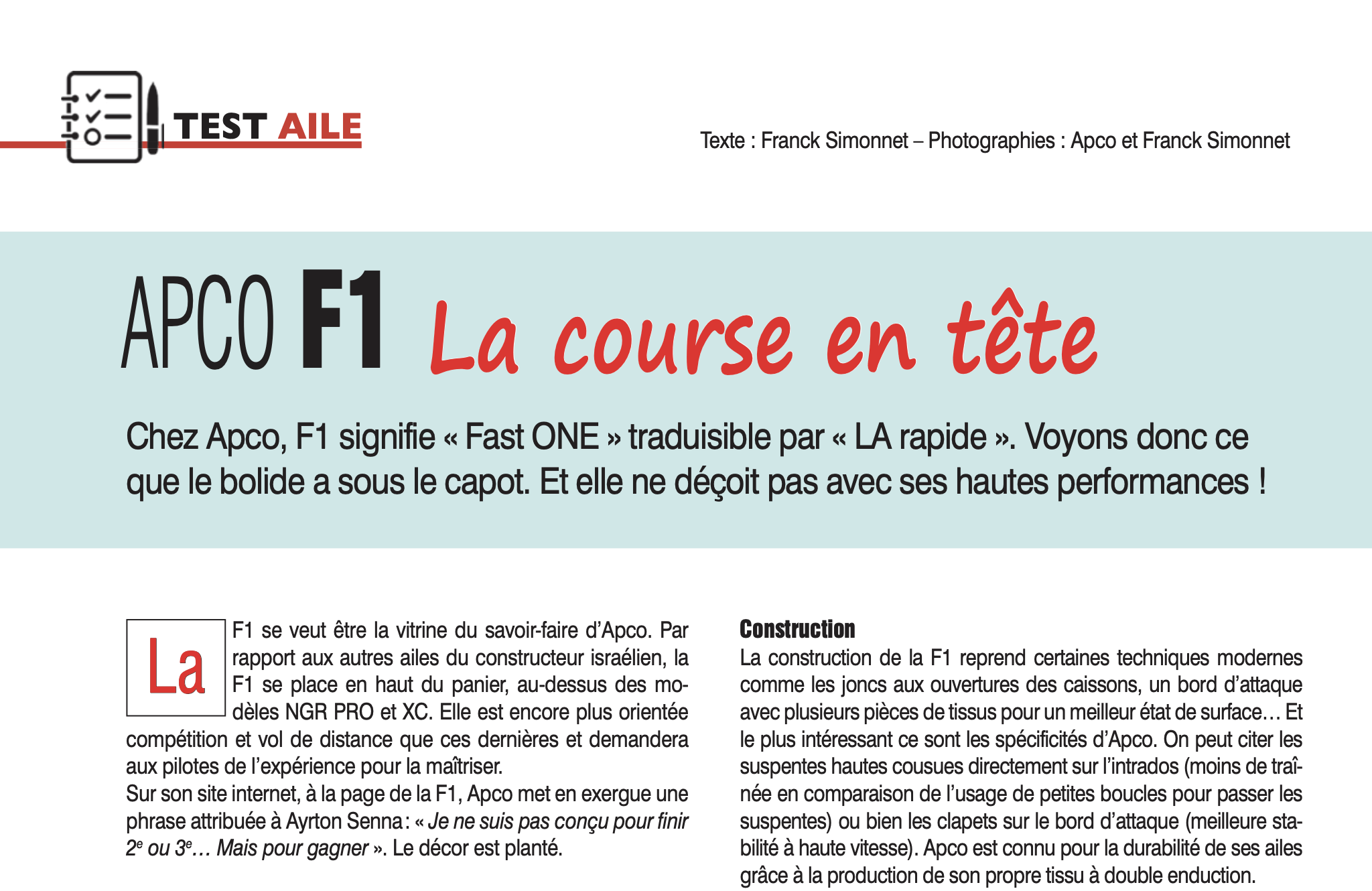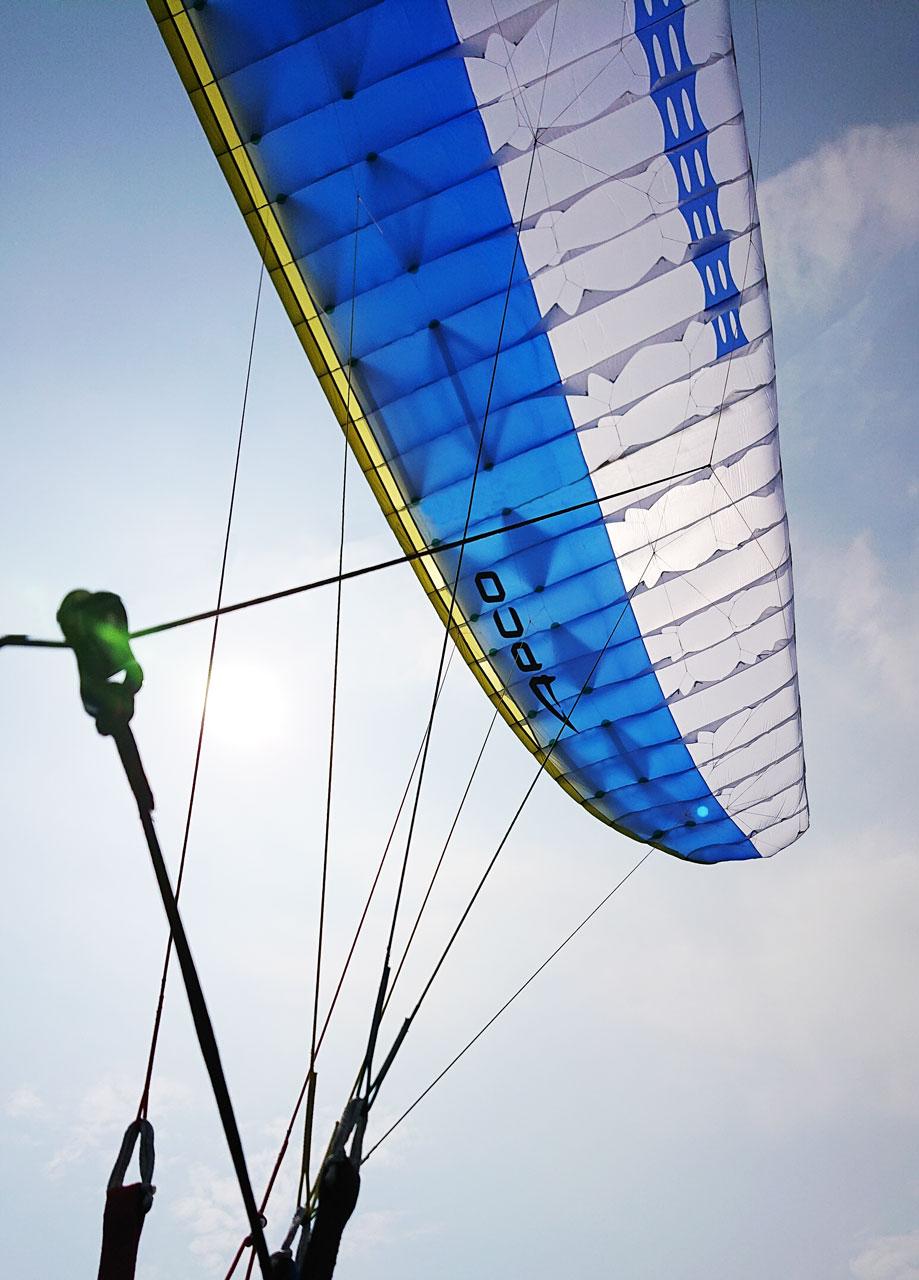La F1 se veut être la vitrine du savoir-faire d’Apco. Par rapport aux autres ailes du constructeur israélien, la F1 se place en haut du panier, au-dessus des mo- dèles NGR PRO et XC. Elle est encore plus orientée…

read more

La F1 se veut être la vitrine du savoir-faire d’Apco. Par rapport aux autres ailes du constructeur israélien, la F1 se place en haut du panier, au-dessus des mo- dèles NGR PRO et XC. Elle est encore plus orientée…

read more

New Apco Ground Handling Wing – The Adama
For several years I have been using various small wings to allow trainees in my paramotor school the chance to learn ground handling skills. The smaller size reduces the physical effort compared to handling a standard size wing, and I have more training days when the wind strength makes it impossible to control anything bigger than 16 metres.
Apco have also recently realised that a small wing would be a useful training aid and I recently had the chance to ground handle Apco’s little ground handling wing called the Adama.
Unpacking the wing the quality materials are normal for Apco, but I have never seen this bright multi colour scheme before. There isn’t too much to say about the simple Adama risers and the simple riser system with trimmers is so simple it allows a beginner to quickly get started. Apco seemed to have developed a wing that is basic, but requires a reasonable level of ground handling technique to be a little challenging. The Adama can be quickly opened up so forward and reverse launch techniques can be practiced in small areas in a wide range of wind speeds. I found it great fun to practice in gusty conditions in sometimes small and difficult areas. The wing has a really small pack down size that is really quick to open in a small space, practice and quickly pack it away again.
The Adama is a perfect combination of a low cost, basic design allowing anyone to practice the essential skills that make take offs easier, safer, therefore reducing the risks to more expensive equipment. The Adama is also an opportunity for paraglider and paramotor schools the use of a low cost training wing reducing wear and tear on a larger flying school wings. Paraglider and paramotor schools may also have more ground handling training days when wind strength becomes a problem.
So I think the Apco Adama will become an important part of paramotor or paraglider training with trainee pilots becoming more skilful with ground handling techniques while practising with this fantastic little training wing.
Paul Haxby

Thomas Mistretta of Dragonfly Paragliding – Florida, USA, goes live on his first flight on the Apco Hybrid, and gives his first impressions of the wing.
“Hi Sally, Yes, I received the Hybrid and have a couple of students this weekend. Going to try and use the Hybrid and promote it more for new students. I have flown it and it’s the easiest inflating glider I’ve ever tried. I posted a first time free flight review / impressions and liked it a lot.
Hope you had a happy New year as it’s been a while but we are getting into our flying season soon.
Best wishes
Tom”

Hey Jonathan –
I think Kyle (P2F) was already going to send this to you but wanted to send too. I took one of the other team pilots’ F1 up and did a review.
Really love the wing man. Good job. Here’s a video and some photos

Hi Jonathan,
I am amazed about the Swift Zero. It is a masterpiece. Hightech until to last detail. Congratulations!
I hope it will be as popular as the Hike.
Thank you and best regards
Gusztáv
Paratrade
Switzerland

Hi Sally,
Wanted to pass to you and to all the Team there the admirations expressed by one of our students here who is flying the Hybrid. The glider serves…

read more

Apco Swift Race Harness Review :: Thermik Magazine :: German
dem Swift will der israelische Hersteller Apco Wettkampfpiloten und XC-Piloten gleichermaßen
ansprechen. Das Liegegurtzeug könnte für Apco das Comeback im Freiflugbereich am deutschsprachigen
Markt bedeuten …
Download the Pdf here:
